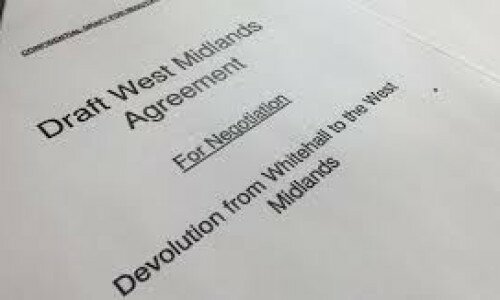
MPs slam lack of public engagement in ‘secret’ devolution deals
MPs have hit out at unnecessary secrecy and a significant lack of public consultation around the devolution deals negotiated by the West Midlands and other city regions.
The said communities were keen to be involved in the devolution process but there had been “a complete, utter and total lack of democratic engagement” and most people did not understand what devolution was about.
The comments reflect criticism over the way the shadow West Midlands Combined Authority handled devolution negotiations with the Government. Elected councillors, even cabinet members in Birmingham, were not allowed to see the draft devolution submission with WMCA chair Bob Sleigh and the then leader of Birmingham council, Sir Albert Bore, blaming the Chancellor for demanding utter secrecy.
However, the Treasury formally denied ever ordering councils to keep the draft submission secret.
The CLG committee reported after several months spent interviewing council leaders, Ministers and civil servants. MPs warned:
We have found a significant lack of public consultation and engagement at all stages in the devolution process. People are keen to be involved; our public session in Greater Manchester highlighted residents’ strong appetite to be included and consulted.
The public should be engaged in the preparation of devolution proposals, insofar as possible during the negotiations and once the results of a deal have begun to make an impact, and communicated to throughout the process.
This is particularly the case for health devolution where the systems in place are complex, changes are consequently more difficult to understand and the public’s response is likely to be more emotional.
The report continues:
For devolution to take root and fulfil its aims, it needs to involve and engage the people it is designed to benefit. There has been a consistent very significant lack of public consultation, engagement and communication at all stages of the deal-making process.
MPs acknowledged that councils had limited time to submit devolution proposals before a September 4 deadline set by the Government, but added:
Despite this, we believe that local leaders could have communicated more effectively and extensively with their residents about the deal process, the contents of the deal and how it would affect them. It should, for example, have been clear to any citizen what their elected leaders were seeking to secure for the area in negotiating a devolution deal with the Government.
We found that the negotiation process in particular had attracted strong criticism and accusations that deals are being made in secret.
While “strongly supporting” devolution and praising the drive of Greg Clark, the Communities Secretary, the committee said the Government’s approach to devolution had lacked rigour and there were “no clear, measurable objectives for devolution, the timetable is rushed and efforts are not being made to inject openness or transparency into the deal negotiations”.
The committee called for a clearer explanation to the public of the complex division of responsibility that would exist between local authorities, the combined authority and, in some places, the directly elected mayor, once devolution deals are up and running.
There was criticism over the Government’s reluctance to hand tax-raising powers to local areas.
The deals did not transfer general powers to local authorities. Instead, they provided cities, working with the local LEP, with a small amount of additional funding to be used flexibly for specific programmes and outcomes.
The Devolution Bill does not enable fiscal devolution, giving only limited financial powers to local areas. One of our Greater Manchester witnesses said, ‘We have had devolutionary powers with almost no devolution of borrowing power….. It’s utterly nonsensical’.”
MPs endorsed the committee’s previous recommendations calling for greater freedom over council tax and business rates, devolution of other property taxes and, in time, the devolution of larger-scale, more comprehensive fiscal powers to groups of local authorities, including borrowing powers and examining the apportioning of income tax and VAT.
Meanwhile, WMCA’s public consultation on its ‘Scheme’ – the membership, powers, functions and voting arrangements – concludes on Monday. Chamberlain News publisher RJF Public Affairs urges people and organisations to use the opportunity to tell council leaders and LEP boards how they view the arrangements.
Similar Articles
PM: gave unlawful advice; frustrated Parliament
"Scenes." As young people would say, writes Kevin Johnson. "Unlawful." "Unequivocal." "Historical." These words are not,
WMCA: Nothing to see here…move along
As the Prime Minister prepared to address leaders ‘up North’ gathering for the Convention of
HS2: new driver needed
Is the Oakervee Review "welcome", "frustrating" or the end of the line for HS2, asks
Dawn goes Down Under
It might appear that Birmingham city council changes its chief executives more regularly than its
Hezza: Give Metro Mayors greater powers to deliver housing, skills and jobs
Britain’s metro mayors should be given greater powers over housing, schools and jobs to truly










